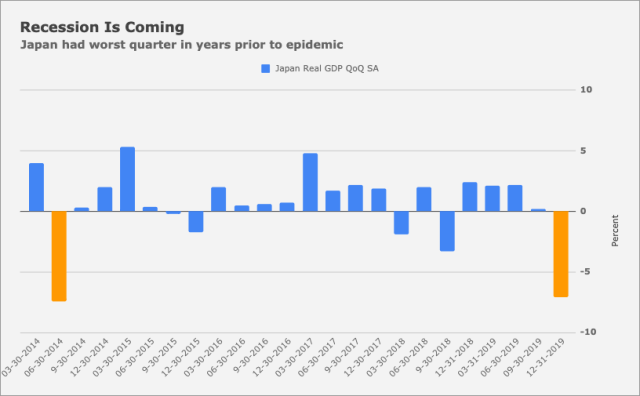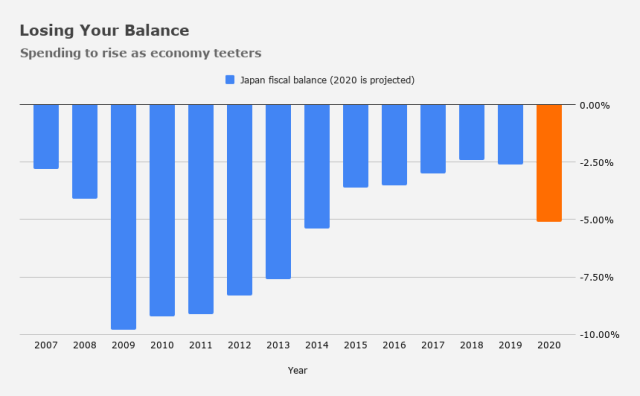Stimulus, stimulus and more stimulus.
That’s been humanity’s answer to the coronavirus so far.
And it’s going to be that way for the foreseeable future.
Less than 24 hours after Donald Trump signed the largest US stimulus package in the nation’s history into law, Prime Minister Shinzo Abe said he’s angling to conjure a supplementary budget for Japan within 10 days aimed at funding a set of measures, including cash handouts to citizens and shelter regional jobs.
These measures are tipped to be more aggressive than anything seen during the crisis, Abe said. This comes just a day after Japan passed the regular budget, which was conceived prior to the pandemic.
Japan, like many other countries globally, came into the health crisis on shaky footing. The economy contracted 7.1% in the fourth quarter of 2019 (revised lower from the preliminary print). That was the worst performance since Q2 2014, a period which, like Q4 2019, was marked by a tax hike. When you toss in a typhoon and the deleterious effects of the trade war, you end up with a precarious situation.
A recession is now assured. Wall Street sees the Japanese economy shrinking between 2% and 3% in Q1, and over the past several days, the news for Japan has worsened.
The Tokyo Olympics were, of course, postponed, and Tokyo Governor Yuriko Koike has instituted stay-at-home guidance amid a sharp spike in virus cases. On Saturday, infections jumped by 60, the largest daily increase of the epidemic, Kyodo said. Tokyo comprises roughly a fifth of Japan’s economy.
To be clear, Japan still has far fewer cases than global “hot spots”, and Abe isn’t declaring an emergency – yet. But even if there’s not an all-out public health emergency, one could argue there is an economic emergency, hence the plan for new fiscal stimulus.
“I want to take actions that will provide a concentrated, short-term boost in demand”, Abe told a media briefing, pledging to use fiscal, monetary and tax policy together, along with “interest-free” loans.
Meanwhile, in China, news out of a Politburo meeting suggests Beijing will widen the deficit and sell more debt in order to fund stimulus after the outbreak crushed the world’s second-largest economy in the first quarter.
Here’s the official, translated bit from Xinhua:
The meeting pointed out that it is necessary to strengthen the adjustment and implementation of macro policies. It is necessary to promptly study and propose a package of macroeconomic policies and measures, proactive fiscal policies, prudent monetary policies to be more flexible and appropriate, appropriately increase the fiscal deficit rate, issue special government bonds, increase the scale of local government special bonds, and guide loans.
It’s been at least 10 years since China’s official deficit topped 3% of GDP. Some have urged China’s leadership to abandon that tacit red line amid the dramatic hit to the Chinese economy, which is now seen contracting sharply.
But, amid the ongoing effort to drown the virus in liquidity and shield businesses and individuals from an existential economic threat, we should all just be honest with each other.
The simultaneous firing of fiscal and monetary “bazookas” across countries and continents is, at heart, an effort to buy time. It’s a coordinated, global push to keep everything from falling apart until the smartest among us (i.e., scientists) know enough about the pathogen to either defeat it in a literal sense (as opposed to the figurative way in which politicians speak about being at “war” with the deadly malady), inoculate against it or, at the least, drive it into obscurity so that it only affects a handful of people each year going forward.
That’s a somewhat grim way to think about things, but the facts have changed materially over the past month. It’s now clear that simply ignoring this particular biological threat (as we do the common cold and the “normal” flu) and going about our business isn’t a safe strategy.
Importantly (and I think this is lost on quite a few Americans, especially those of a Libertarian bent), it’s not clear that acquiescing to the sickness and death that would invariably occur if we simply abandoned containment protocols and reopened the economy is even a good strategy from a Utilitarian perspective. That is, I’m no immunologist, but as things stand, it seems at least possible that allowing the coronavirus to spread unchecked in the United States would produce a worse overall outcome for humanity even considering the offset from allowing everyone to return to work in the course of ramping the economy back to full speed.
In other words, it’s not clear that the utilitarian argument being promoted by Trump (e.g., “The cure is worse than the disease”) is actually a good argument.
It’s true that COVID-19 isn’t Ebola, or Marburg (which, if they mutated and spread unchecked, would have the potential to wipe out the human race, in a very literal sense), but it’s not the common cold either. It is entirely possible that the misery and suffering that would accompany the wholesale proliferation of this particular virus across the country would more than offset all of the positives associated with putting everyone back to work, reopening entertainment venues, resuming sports leagues, etc.
Food for thought, as US cases surpass 102,000, on the way to… well, on the way to a higher number.








A few observations from the last few weeks- education can be provided very effectively and relatively inexpensively on line and healthcare can be provided remotely ( tele-medical) much more effectively and extensively than previously allowed- which has to cost far less than under the current US healthcare model.
Maybe there is a path in the US to government provided
1. on line college education (I love what Khan Academy and US universities -via Zoom, etc. have been doing) and
2. a basic level of universal health coverage that will not bankrupt the country.
However, where I personally struggle is if upcoming students want/demand free housing/living/partying expenses while they are pursuing “free on line education” or US citizens demand unlimited in person visits to their doctors. This could be supplemented with private healthcare/insurance.
Can the US navigate a path that takes care of the educational and medical needs of its people without destroying capitalism and the opportunity for people who work harder and smarter than others to be rewarded economically? I hope so, but I remain skeptical.
Everyone is firing bazookas now because it is going to get much worse. It will not be enough. Draghi is the only one who understands that if you are going to go down this policy road best to do it in a vehicle that can go 0-60 at the speed of light.
In a melancholic, melodramatic kinda way, I’m conjuring up Images of Fay Ray and her significant other, Mr Kong. As I recall, the bazookas were brought out, but initially, not much happened. Sadly, I can’t recall much about how that all ended, but the overarching premise was that Nature is more powerful than Trump’s best day on a golf course. Perhaps Mr Kong represented capitalism and unleashed animal spirits, or perhaps the real underlying story is the bond between Kong/Fay which metaphorically presents the dynamic of compassion and communication, i.e, Fay’s human spirit understood that the capitalistic pigs that captured and enslaved Kong, were far more evil hearted than anything nature can create. Those hearts of darkness and their dna genetic strain, are symbolic of the tribal mindset which is bringing out bazookas this week, it’s an animal spirit, which at heart is evil. They are not looking to save society or help people, they are managing their power and putting on a special edition game show and campaign rally.
Nevermind
What those morons do not unterstand is that the problem is not the number of confirmed cases nor the deaths. What matters it’s the number of infected patients that need hospitalization. Unsurprisingly, headlines are all about confirmed cases and deaths, not about the number that are under care. In italy, 30.000 are hospitalized. The country as a total of ca 200.000 hospital bed, so COVID patients are using 15% of the healthcare capacity (and 50% of available ICU). That’s the simple reason you must contain the virus at every cost. Not the confirmed cases, not even the deaths matters (at least each dead means a bed is available for someone else).
And ventilators are useless: they only extend the agony of those that will not survive anyway. Lacking an effective drug treatment that can actually defeat the virus, ventilators have the perverse effect of increasing the strain on the hospitals..
So, the Fed with Treasury SPV is stepping up to buy UST, IG, CP and IG ETF.
When do they step up to buy HY, HY ETF, and EQUITY and EQ ETF? Is that a bridge too far?
H-Man, you live on an island so you have seen a hurricane or two. The markets are not pricing that hurricane. Investment values are being driven by a spreading virus. Unfortunately, no one knows if is this a Cat 5 or Cat 12.
Highly recommended John Authers piece on moral perspectives. Utilitarian is a difficult one to sell politically, but might be the one causing the least damage in the long run. A pessimist might conclude that in a dysfunctional world it will not be chosen, https://www.bloomberg.com/opinion/articles/2020-03-29/coronavirus-pandemic-puts-moral-philosophy-to-the-test?sref=Fkccl0vj